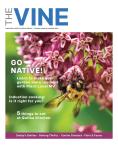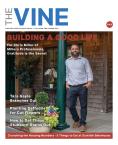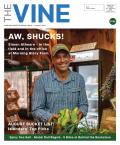By all accounts, food journalism is “having a moment.” In 2011, for the first time, the AP Style Guide (a grammatical bible for writers and editors) added its first ever food section. The Oxford English dictionary now includes words like “nom nom,” “foodie,” and “sammich.”
Writing about food, which I’ve done now for just a few months shy of a decade, was never something I set out to do. And, especially at the beginning of my career, it was anything but trendy or glitzy. It was dirty, gritty, and messy – at times quite literally.
I was only about two months in to my job as a reporter at this newspaper when I inherited Farm & Field, a seasonal, weekly column on all Island things farming and a
griculture. I had never written about food. I had never grown anything, except for a plant that I nearly killed every school year and which my mother would nurse back to health every summer.
I didn’t even eat meat.
I was terrified to take over the column, but I started doing my research. I wondered how the Vineyard’s young people learned about their own local agriculture, what life was like on the Island’s only working orchard, and what makes some soil better than others.
And then there were the dirty, gritty, messy times – waking up before dawn to go out oyster farming on Katama pond, tromping into the fields at Morning Glory Farm, and the disaster my kitchen became after I bought my first tomato plant and, in late August, cut up the juicy fruits of my labor to make bruschetta.
What I discovered in the process was not “the next hot restaurant” or “the new kale.” What I found were stories – about the people and history that make this island what it is, about the importance of land in our local culture, and about how our economy works. Where I happened to find these stories was in food, from the seeds we plant here to the discussions we have about slaughtering our animals. On this Island, the way we talk about food is tied up with our identity; it reinforces our self-sufficiency and connects us to our natural beauty. For me, this is the heart of food journalism: the chance to share stories, to connect, and to dis cover more about ourselves through the places we live and the traditions we hold dear. Writing about food is about more than just buzzwords. The food we grow here binds us in very powerful ways to each other, and learning about where our food comes from encourages us to listen to each other, to savor the small things (like oysters and fresh August corn), and to think about our roots. Julia Rappaport, a former Gazette re porter, is the managing editor of a New England food and cooking magazine.











Comments